Dear Friends,
This picture of Kyabje Lama Zopa Rinpoche came to us many years ago, along with this note:
We had a brief visit from one Lhasa Apso who lived with Rinpoche for one week (until his owner made contact.) We found him lost in the local Walmart car park. He was quite scared of us but as soon as he saw Rinpoche he went straight over and sat at the head of the table with Rinpoche. Rinpoche offered Jangsem (his temporary name) his own fleece blanket. Each day he was here Rinpoche ran with Jangsem – picture Rinpoche hiking up his shemthab and dog running full speed with ears flapping… Rinpoche laughing so hard...
The Lama Yeshe Wisdom Archive is filled with jewels like these, moments in the lives and teachings of Lama Yeshe and Lama Zopa Rinpoche that our team is delighted to be able to share with all of you. We very much appreciate the support so many of you offer to help us continue in our work of preserving and making available the words and images of our precious Lamas with everyone, everywhere. Read on for highlights of our offerings this past month, and our plans for upcoming publications.
BIG LOVE AUDIOBOOK HEART PROJECT
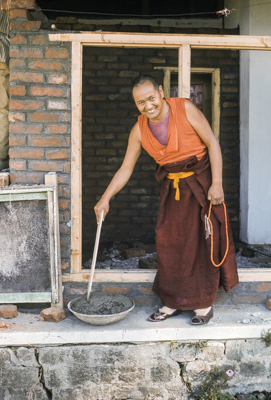 We are happy to share another audiobook installment of Big Love: The Life and Teachings of Lama Yeshe, written by Adele Hulse. Organized by Janet Brooke, this heart project is comprised of narrations recorded by personal friends of the late Åge Delbanco (Babaji), one of Lama Yeshe's earliest students.
We are happy to share another audiobook installment of Big Love: The Life and Teachings of Lama Yeshe, written by Adele Hulse. Organized by Janet Brooke, this heart project is comprised of narrations recorded by personal friends of the late Åge Delbanco (Babaji), one of Lama Yeshe's earliest students.
This month the Big Love Heart Project brings you Chapter 12: 1974: Introducing Vajrasattva, narrated by George Galt. Chapter 12 includes the ordination and training of the Western Sangha, activities of the sixth and seventh Kopan meditation courses, the blessings of the Kalachakra and Vajrasattva initiations, and stories of the Lamas' first teaching tour to the West.
This is an incredible opportunity to listen to this extraordinary account of Lama's life read by people who were there as the story unfolded, especially if you do not have a copy in hand. As a reminder for our Members, you receive a 50% discount when you order Big Love from our online store, and if you already have a copy, you can order one and have it sent to a friend as a gift!
ON THE LYWA PODCAST: Relying on the Buddha
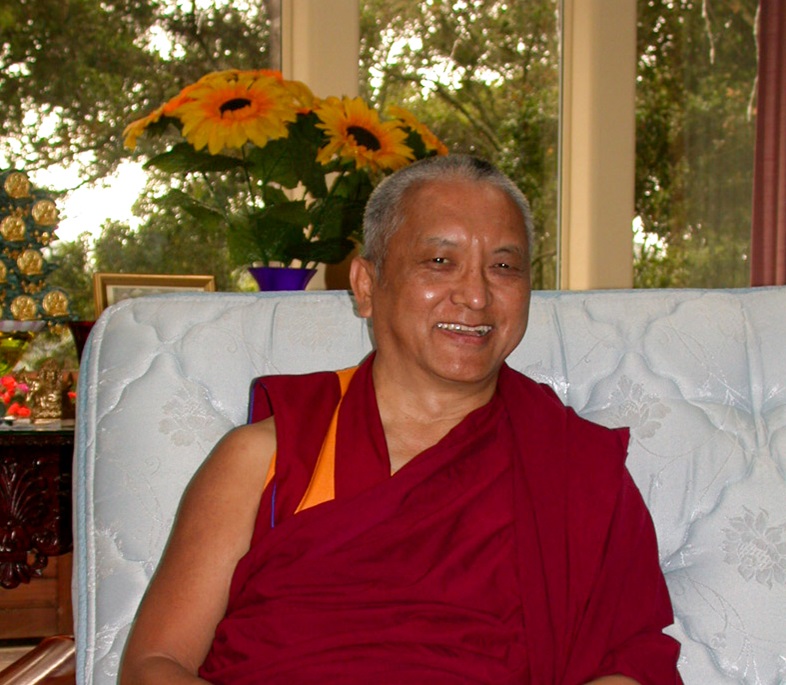 Because we rely on the methods revealed by Buddha – the path to liberation and enlightenment – we naturally are taking refuge in the Buddha.
Because we rely on the methods revealed by Buddha – the path to liberation and enlightenment – we naturally are taking refuge in the Buddha.
– Lama Zopa Rinpoche
This month on the LYWA podcast, Lama Zopa Rinpoche explains why we naturally take refuge in the Buddha by relying on his teachings. Rinpoche then requests the blessings of the lineage lamas, followed by a recitation of The Foundation of All Good Qualities, the lamrim prayer by Lama Tsongkhapa. These teachings were given by Rinpoche at the 33rd Kopan Meditation Course, held at Kopan Monastery, Nepal, in 2000. You can follow along with the unedited transcript on our website.
The LYWA podcast contains hundreds of hours of audio, each with links to the accompanying lightly edited transcripts. See the LYWA podcast page to search or browse the entire collection by topic or date, and for easy instructions on how to subscribe.
FROM THE VIDEO ARCHIVE: Thought is Action
This month from the LYWA video archive Lama Zopa Rinpoche guides us in a contemplation of those we perceive as the enemy. This excerpt is from the Ganden Lha Gyäma retreat and Yamantaka initiation offered by Lama Zopa Rinpoche at Instituto Lama Tzong Khapa in Pomaia, Italy, in 2004.
Visit and subscribe to the LYWA YouTube channel to view more videos freely available from our archive. See the FPMT YouTube channel and the Rinpoche Available Now page on the FPMT website for many more videos of Lama Zopa Rinpoche’s teachings.
What's New On Our Website
This month we share with you a new Brazilian Portuguese translation of Lama Yeshe and Lama Zopa Rinpoche's Freedom Through Understanding, translated by Centro Shiwa Lha, the FPMT Center in Rio de Janeiro, Brazil. You can freely download this PDF and access many other titles on our Portuguese Translations page. At present, LYWA titles have been translated from English into 18 other languages!
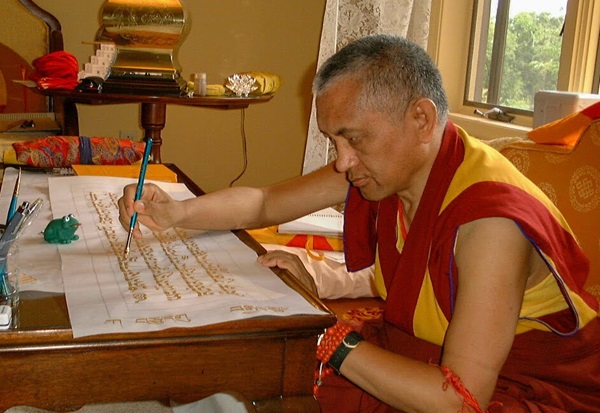 This month we have posted the remaining lectures given by Lama Zopa Rinpoche at the 52nd Kopan Course in 2019. The course took place in the newly finished Chenrezig Gompa with a record attendance of around 270 participants. This was just before the COVID19 pandemic hit and the world went into lockdown. An excerpt from Lecture 7 of this course is included in the monthly teaching below.
This month we have posted the remaining lectures given by Lama Zopa Rinpoche at the 52nd Kopan Course in 2019. The course took place in the newly finished Chenrezig Gompa with a record attendance of around 270 participants. This was just before the COVID19 pandemic hit and the world went into lockdown. An excerpt from Lecture 7 of this course is included in the monthly teaching below.
The forthcoming ebook of Rinpoche's teachings from this course will be the next publication for LYWA’s Kopan eBook Project. Editor Gordon McDougall is overseeing the project, which aims to publish ebooks of all the annual Kopan courses, including those already published as ebooks and on our website and those not yet published.
We’ve also added new entries to Lama Zopa Rinpoche’s Online Advice Book. Each year, we include over 100 new pieces of advice on various topics, bringing the total to more than 2,500 entries now available on our website.
The Real Purpose of Our Life: Rinpoche sent this long letter to a relative about their motivation for going to work. Rinpoche emphasized the importance of a pure motivation, cherishing others who are most dear, most precious and most kind.
The Prison of Samsara: A student in prison asked Rinpoche to be his guru and how to practice in prison. Rinpoche sent this advice about using thought transformation to escape the inner prison of attachment, anger and ignorance.
Everything Comes from the Mind: This advice, with quotations about karma and intention, was given to a student from Russia who was very upset about the current war.
Whether to Blow Out Candle Offerings: A student asked Rinpoche about extinguishing tea lights which had been offered or whether to leave them burning after the center closed for the night.
You can always find a list of all the newly posted advices from Lama Zopa Rinpoche on our website.
Report from the Field: Celebrating Fifty Years of Dharma in Australia
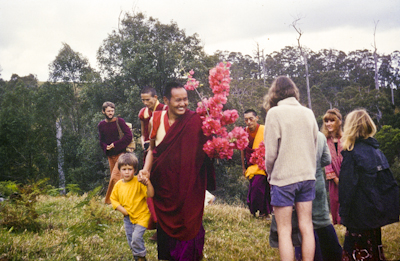 Our web editor, Sandra Smith, reports:
Our web editor, Sandra Smith, reports:
On 28th September 1974, after completing a one-month meditation course in Diamond Valley, Queensland, Australia, Lama Yeshe and Lama Zopa Rinpoche walked with students to bless the land that would become Chenrezig Institute for Wisdom Culture. The lamas’ vision was to bring the Dharma to the West and they worked tirelessly to accomplish this. For this we are so very grateful. We can also rejoice in the generosity of Nick Ribush, Marie Obst (Ven. Yeshe Khadro), Kathy and Tom Vichta, who donated the large rural property to the Lamas in 1974. (You can see video taken during the Diamond Valley course in 1974 on our YouTube channel.)
Nick is travelling from the US to join the fiftieth anniversary celebration, the Big Love Festival, where he joins special guests from all over the world, including Tenzin Ösel Hita, Geshe Zopa, many other Sangha and hundreds of lay people. The three-day festival celebrates all that has been achieved at Chenrezig Institute over the past fifty years through the efforts of the dedicated volunteers, staff and community, who created a stable foundation for the Dharma to flourish, and paved the way for future generations of practitioners.
All of us at the Lama Yeshe Wisdom Archive are also so grateful for the guidance and vision of Lama Yeshe and Lama Zopa Rinpoche as we continue in our mission to preserve the precious teachings of the Lamas and make them available to interested seekers around the world. As always, we are so grateful for the support of our Members and donors, who make this important work of bringing peace and happiness to the world possible.
Read on for this month's teaching by Rinpoche on generating compassion for all beings.
Big love,
Nick Ribush
Director
THIS MONTH'S TEACHING: Compassion has to Arise!
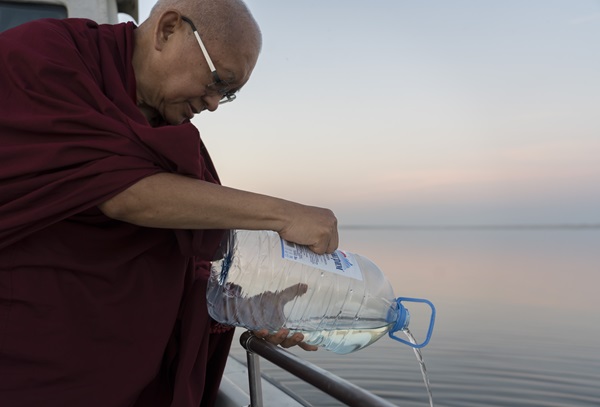 Tonglen is so good. It is the best Dharma practice, the best meditation. Especially for us, it is the best meditation. Some people may say, “I meditate on chakras, winds, drops,” things like that. Some people only talk of dzogchen. They never mention lamrim, bodhicitta, emptiness. They only talk and think in that way, that dzogchen is the only worthwhile thing. We might think it is something very high, but actually this practice is the best Dharma practice, the best meditation. If you want to know what is the best meditation, this is the best meditation. If you have that question, it’s this. It’s so great.
Tonglen is so good. It is the best Dharma practice, the best meditation. Especially for us, it is the best meditation. Some people may say, “I meditate on chakras, winds, drops,” things like that. Some people only talk of dzogchen. They never mention lamrim, bodhicitta, emptiness. They only talk and think in that way, that dzogchen is the only worthwhile thing. We might think it is something very high, but actually this practice is the best Dharma practice, the best meditation. If you want to know what is the best meditation, this is the best meditation. If you have that question, it’s this. It’s so great.
Maybe, I’ll mention it today since Robina went over the seven techniques of Mahayana cause and effect, the bodhicitta meditation. [Ven. Robina: We went over the seven techniques a few times.] I’ve not finished the quotation, but maybe I’ll mention it here anyway. You must pay attention. It is very important. The best meditation is bodhicitta, to practice bodhicitta. You must write it down, to not forget.
You heard briefly about the suffering of the six-realm sentient beings. We begin by taking the sufferings of other sentient beings, generating compassion for them, as I told you already. We study what is described overall in each realm of suffering. Not only that, when sentient beings in other realms were human beings, they experienced the six types of suffering, the seven types, the eight types of suffering. In Lamrim Chenmo I think only six are explained, but in the outline there are seven or eight.
Each individual sentient being has experienced the suffering of each realm, not only once but numberless times from beginningless rebirths. Numberless times from beginningless rebirths, every sentient being has been experiencing the hell realm sufferings, the hungry ghost realm sufferings. Numberless times from beginningless rebirths, without beginning. When the suffering began, there is no beginning. There is no beginning for the continuation of mind. It is beginningless. Delusion, the cause of suffering, is beginningless. Karma and delusions are beginningless. That is unbelievable, unbelievable, most unbelievable.
Not only that, most sentient beings don’t have the karma to meet the Buddhadharma, the holy Dharma. For eons and eons and eons, they don’t have the karma to meet a buddha. Without practicing Dharma, without actualizing the path, there is no way to be free from suffering. So, then they will have to experience suffering in samsara again and again, endlessly! Can you imagine?
Thinking like that, we develop unbelievable compassion for every sentient being, for all the numberless sentient beings in samsara. I gave you an example of how to meditate on compassion when you go to the beach, for the naked people lying there and the animals in the water. Remember I told you how to develop compassion? You walk along the beach and meditate on compassion. Not only at the beach, I told you that where there are a lot of people, you can do that meditation to develop compassion.
Compassion has to arise. There’s no choice! Compassion has to arise! As His Holiness [the Dalai Lama] says, human beings are in the nature of loving kindness and compassion. That is our nature. His Holiness said to develop that.
Excerpted from Lecture 7, Kopan Course No. 52, Kopan Monastery, Nepal, November-December 2019. Lightly edited by Gordon McDougall. You can watch Lama Zopa Rinpoche giving these teachings on the FPMT Essential Extracts page.































